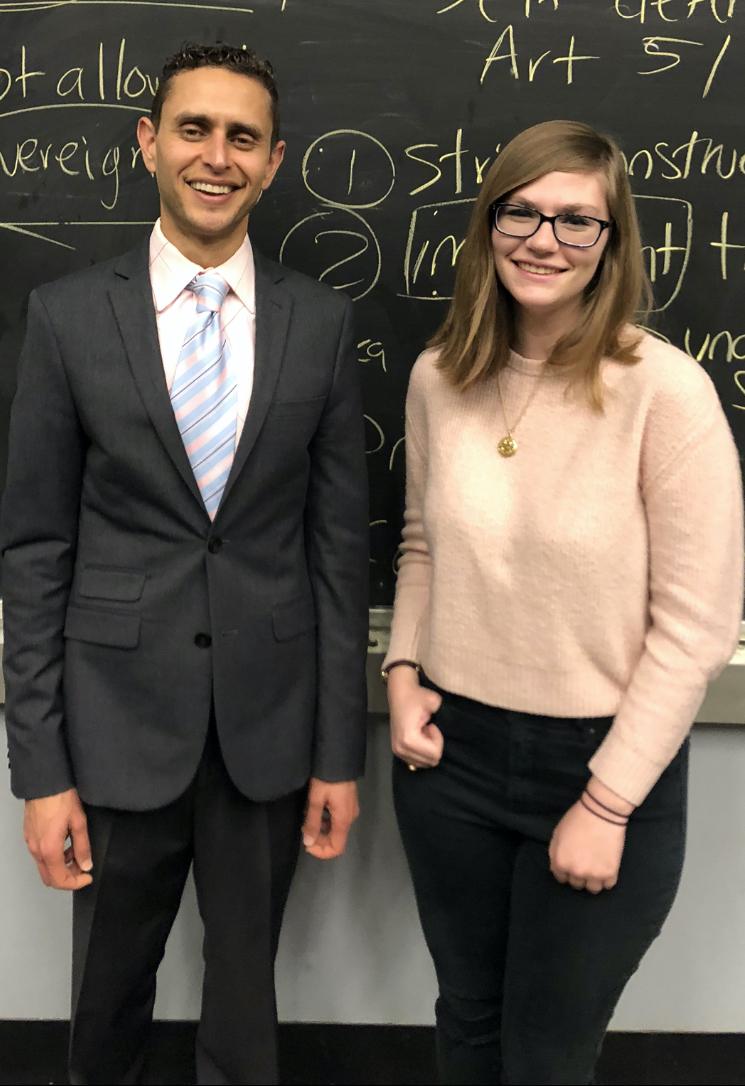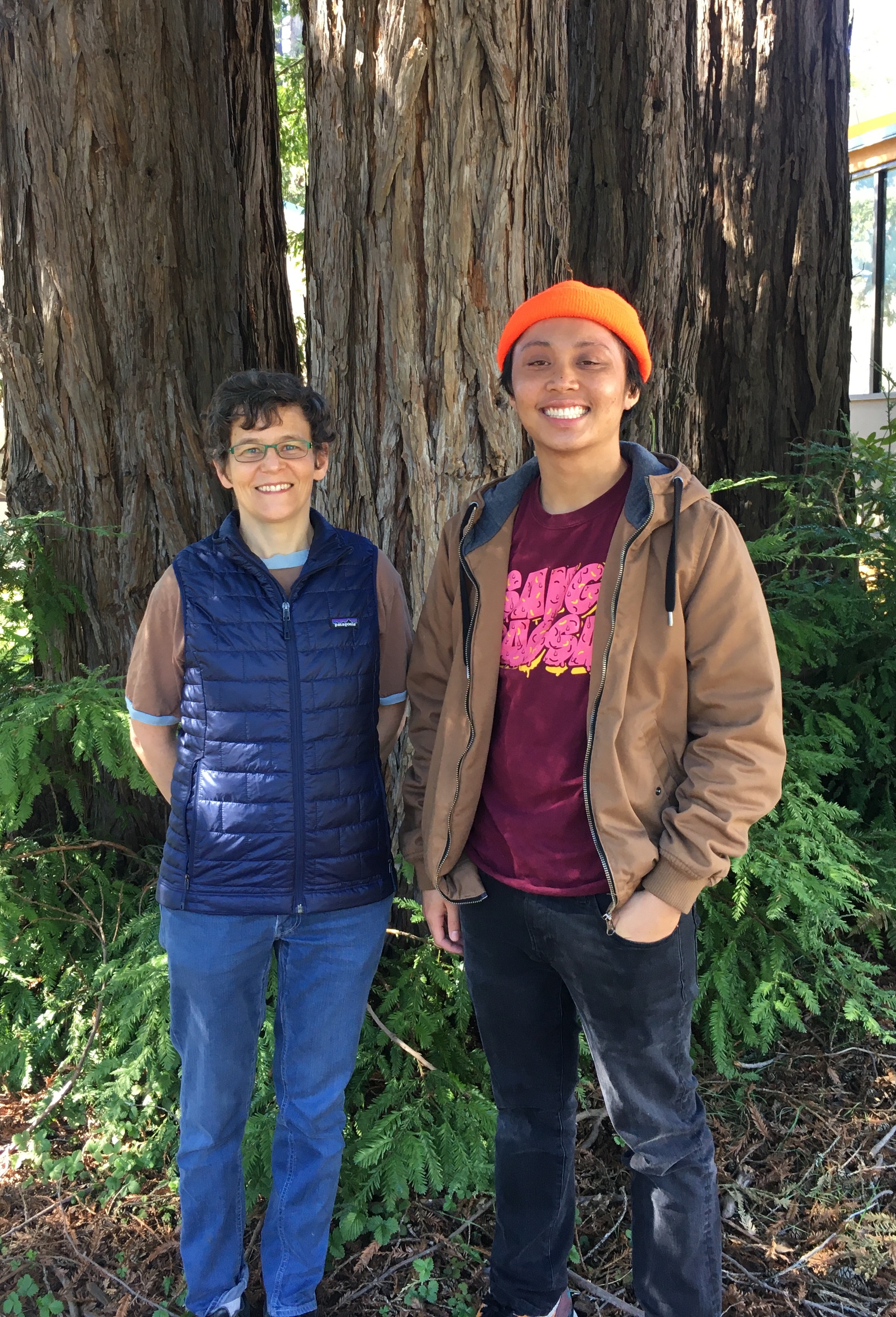2019-2020 Mentorship Participants
Karen Stout: 
Karen Stout is a second-year Legal Studies major originally from Culver City, California. Karen is a resident assistant at Merrill College. Her interests are in international law's impacts on sovereignty, and colonial and postcolonial legacies of law. Karen is a former student of Professor Massoud's International Law course, and she plans to study overseas in the Hague in 2020. She hopes to attend law school after her graduation from UCSC.
Merrill Fellow Mark Massoud:
Mark Fathi Massoud is Director of the Legal Studies Program and Associate Professor of Politics and Legal Studies at UC Santa Cruz. His research focuses on the politics of law and religion, particularly in settings dealing with legacies of political violence. He has received Guggenheim and Carnegie fellowships and, in 2021, he will deliver the Oxford University Evans-Pritchard Lectures.
Project Description:
Karen Stout will assist Professor Massoud by creating an annotated bibliography and literature view of writing by African and non-African scholars on race, religion, and law in Africa.
She will be gathering and reading existing scholarly literature and producing an annotated bibliography of scholarship at the intersection of race, religion, and law. Karen will begin by compiling a literature review of materials written by and about Sir Evans-Pritchard, who is one of the founders of the modern discipline of anthropology, and then quickly turn to literature by African scholars who draw from and critique the views put forward by European and North American anthropologists and legal scholars.
--------------------------------------------------
Carl Fan:
Zhiheng (Carl) Fan is from Newport Coast, CA. He is a junior, graduating in June 2022 with a B.A in History with a concentration in European and Jewish Studies, and B.S in Technology and Information Management(TIM). His primary interest is Europe during the beginning of the 20th century, in particular, the Great War. His endeavors in and devotion to history, as well as to technology, cultivated him as a generalist. He has knowledge of American Sign Language, French, and programming. He has worked for a number of associations in different areas: education, non-profit organizations, student-led organizations, and counseling teams. After graduating from UCSC, he plans to go to law school to become a public defender for disabled people, especially those who are deaf. After that, he still yearns to acquire a Ph.D. in history.
Merrill Fellow David Brundage:
David Brundage is Professor of History. He has published widely in the areas of U.S. immigration history and the history of the Irish diaspora, and is the author, most recently, of Irish Nationalists in America: The Politics of Exile, 1798-1998 (Oxford University Press, 2016).
Project Description:
“W. E. B. Du Bois and the Irish Revolution: Anti-colonial Activism in New York and Paris, 1916-1920” will focus on the evolution of Du Bois’s attitude towards the Irish Revolution, with particular attention to his interactions with Irish independence leaders in New York and Paris and to the larger anti-colonial networks in which he took part. Carl will be doing research in a range of online primary sources (unpublished letters in Du Bois Papers, his published writings in magazines and newspapers, etc.) and preparing research memos for the project.
Lucia Ortiz:
Lucia, is a fourth year undergraduate student double majoring Latin American and Latino Studies and Sociology. She was born and raised in Los Angeles and is a first-generation college student. As a former high school youth organizer from East Los Angeles, Lucia is passionate about youth organizing and the ways in which youth leaders have mobilized in her community back home. As a peer advisor on campus she strives to help other students like herself in their undergraduate career by providing resources that are essential to their success. After UCSC, Lucia hopes to further her education with graduate school in order to continue helping and supporting her community and youth through community organizing and higher education.
Merrill Fellow Jessica Taft:
Taft, is an Associate Professor in Latin American and Latino Studies. She is an interdisciplinary youth studies scholar whose work focuses on the political lives of children and youth across the Américas, with an emphasis on youth activists and youth social movements. She is the author of two books, Rebel Girls: Youth Activism and Social Change Across the Americas and The Kids are In Charge: Activism and Power in Peru’s Movement of Working Children, as well as several journal articles about girls and feminism, youth citizenship, and intergenerational relationships within social movements.
Lucia and Professor Taft will be working together on a new research project on different programs that aim to incorporate youth into municipal governance, including youth councils and youth participatory budgeting. They’ll be transcribing, coding, and analyzing preliminary interviews with youth and staff from these programs in order to identify potential future lines of inquiry.
Tyler-Marie Deveau:
Tyler-Marie Deveau is currently a third year student with a major in Biochemistry and Molecular Biology as well as a minor in Bioinformatics. She was born and raised in the Southern California town of Redlands, though her mother was born in Venezuela and her father in Kodiak, Alaska from Sun’aq of Alutiq. Her interests include cell to cell communication, immunological development, and medical impact, as well as gene expression and its impact on the aforementioned subjects. She hopes to disseminate the knowledge of scientific research and STEM education for people across the globe, as well as affording opportunities to all people seeking an education. She is extremely grateful for the opportunity to work with Dr. Martha Zúñiga in her research lab, and for the opportunity to represent Merrill college as an affiliate.
Merrill Fellow Dr. Martha Zúñiga:
Dr. Zuniga is a Professor in the Department of Molecular, Cell, and Developmental Biology. She is a member of the Health Sciences Advisory Committee of the MCD Department. She also is a long-standing faculty mentor for the UCSC STEM Diversity Programs and a life-time member and former board member of the Society for the Advancement of Chicanos and Native Americans in Science (SACNAS). She teaches the Health Sciences Internship course and Virology and for twenty-five years she taught the Immunology courses. In 2014 she was awarded the Ron Ruby Award for Teaching Excellence in the Physical and Biological Sciences for her creative teaching of Immunology and for inspiring a passion for Immunology in her students. A recipient of the Presidential Young Investigator Award (1990), she does research on the development and maintenance of immunological tolerance.
Project Description:
A properly functioning immune system enables an individual to mount effective responses against pathogens and tumor cells while also not attacking self-tissues. In normal individuals, this balance is achieved by two processes. In the first, the developing T and B cells of the immune system undergo specialized genetic rearrangements to generate antigen receptors. Each T or B cell expresses a unique antigen receptor; collectively all of these cells can respond to any foreign molecule that enters the body. But the genetic rearrangements occur at random, so it is possible that some of the antigen receptors can bind to self-molecules. These T and B cells whose antigen receptors can bind to self-molecules must be silenced or eliminated to prevent autoimmune disease. Screening and removal of auto-reactive T and B cells begin during their development.
Using these tools we are examining how T cells with auto-reactive antigen receptors are dealt with during their development and maturation in the thymus. The FACS experiments that we have done in the lab have generated an enormous amount of data that must be carefully analyzed so that we may draw conclusions from our experiments. Alicia and Steve will use a powerful software package called FlowJo to analyze the data. They will produce a quantitative and qualitative analysis of the development of T cells in different lines of mice generated in our lab. The ultimate goal of these studies is to elucidate the stages at which auto-reactive T cells are either deleted or silenced during their development in the thymus.
--------------------------------------------------
 Jared Semana:
Jared Semana:
Jared Semana is a fourth-year Critical Race and Ethnic Studies major originally from Stockton, California. Jared is also the Vice-Chair of Anakbayan Santa Cruz, a youth and student organization that advocates for National Democracy in the Philippines. His interests are Philippine Studies, international workers' movements, and the ways in which cultural production intersect with revolutionary movements. Upon graduating this next Spring Quarter, Jared hopes to stay in the Santa Cruz community and continue to expand human rights work for the Philippines in the area
Merrill Fellow Megan Thomas:
Megan Thomas is an Associate Professor of Politics, where she has taught courses on political theory since 2003. She does research on Philippine intellectual and social history, is co-director of UCSC’s Center for Southeast Asian Coastal Interactions (SEACoast), and is serving as the executive secretary of the Philippine Studies Group, a committee of the Association for Asian Studies.
Project Description:
The project has two parts. The first combines research on Philippine history, politics and society with a curricular development project for a new course on Philippine Studies. The second aspect of the project is to work on collaboration between UCSC’s new Center for Southeast Asian Coastal Interactions (SEACoast) and student groups, and on SEACoast’s own curricular ambitions. We hope these projects will have a long-lasting impact on the richness of our institution’s offerings in Southeast Asian studies and for Southeast Asian and Southeast Asian heritage students.
--------------------------------------------------
Audrey Herbert:
Audrey Hebert is a third-year general Literature major from San Diego County, with an interest in fiction and how it reflects a society's culture. Her love of humor writing led her to the Fish Rap Live, UCSC's satire paper, where she is currently the co-editor in chief. Last year, she was a course assistant for the Merrill Core course. After graduation, she is interested in the field of K-12 education.
Merrill Fellow Camilo Gomez-Rivas:
Camilo Gómez-Rivas is an associate professor in the Department of Literature where he teaches courses in Arabic literature, Mediterranean and medieval studies, and Islamic law. His current research focuses on the reception of displaced populations and narratives of belonging in the western medieval Mediterranean. He is the author of Law and the Islamization of Morocco under the Almoravids: The Fatwās of Ibn Rushd al-Jadd to the Far Maghrib (Brill 2015).
Project Description:
A Critical Bibliography of Mālikī Law: Toward a Social History of an Islamic School of Law
Audrey will help coordinate and actively contribute to the development of an interactive bibliography on the history of Maliki Madhhab, the dominant Islamic Legal School of North and West Africa. The idea is to put together a multi-authored annotated bibliography on the history of the development of this legal school, from its origins in the 8th and 9th centuries, beginning with its most important primary sources, reference works, editions and translations into European languages, and move to include the most important secondary studies, grouped by theme or approach.
This project will develop into a resource for scholars interested in researching the field as well as foundation for a book project on the social and cultural history of Malikism.
--------------------------------------------------Merrill Fellow Terry Burke:
Project Description:
Previous partners in the Undergraduate Research Mentorship Program:
Click here to read about the 2018-2019 participants.
Click here to read about the 2017-2018 participants.
Click here to read about the 2016-2017 participants.
Click here to read about the 2015-2016 participants.
Click here to read about the 2014-2015 participants.
Click here to read about the 2013-2014 participants.
Click here to read about the 2012-2013 participants.
Click here to read about the 2011-2012 participants.
Click here to read about the 2010-2011 participants.
Click here to read about the 2009-2010 participants.
Click here to read about the 2008-2009 participants.
